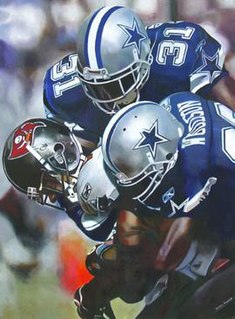A Quote by Friedrich Nietzsche
Man is not equally moral at all hours, this is well known. If his morality is judged to be the capability for great self-sacrificing resolutions and self-denial (which, when continuous and grown habitual, are called holiness)
Related Quotes
Man—every man—is an end in himself, not a means to the ends of others; he must live for his own sake, neither sacrificing himself to others nor sacrificing others to himself; he must work for his rational self-interest, with the achievement of his own happiness as the highest moral purpose of his life.
The very act of faith by which we receive Christ is an act of the utter renunciation of self, and all its works, as a ground of salvation. It is really a denial of self, and a grounding of its arms in the last citadel into which it can be driven, and is, in its principle, inclusive of every subsequent act of self-denial by which sin is forsaken or overcome.
His constant fight is with the Nafs (self-interest), the root of all disharmony and the only enemy of man. By crushing this enemy man gains mastery over himself; this wins for him mastery over the whole universe, because the wall standing between the self and the Almighty has been broken down. Gentleness, mildness, respect, humility, modesty, self-denial, conscientiousness, tolerance and forgiveness are considered by the Sufi as the attributes which produce harmony within one's own soul as well as within that of another.
It is man's intrinsic and irreducible self-responsibility to humanize himself, to exercise his entire range of rational and moral resources to raise his mode of being and seeing and acting above not just that of animals, but also above that of the majority of subhuman (never to be self-realized) humans who will never draw themselves into a self-punishing position of focal self-diagnosis and self-accountability.
If any man would come after me, let him deny himself." The disciple must say to himself the same words Peter said of Christ when he denied him: "I know not this man." Self-denial is never just a series of isolated acts of mortification or asceticism. It is not suicide, for there is an element of self-will even in that. To deny oneself is to be aware only of Christ and no more of self, to see only him who goes before and no more the road which is too hard for us. Once more, all that self denial can say is: "He leads the way, keep close to him.
The great characteristic of men of active genius is a sublime self-confidence, springing not from self-conceit, but from an intense identification of the man with his object, which lifts him altogether above the fear of danger and death, which gives to his enterprise a character of insanity to the common eye, and which communicates an almost superhuman audacity to his will.
No value is higher than self-esteem, but you've invested it in counterfeit securities-and now your morality has caught you in a trap where you are forced to protect your self-esteem by fighting for the creed of self-destruction. The grim joke is on you: that need of self-esteem, which you're unable to explain or to define, belongs to my morality, not yours; it's the objective token of my code, it is my proof within your own soul.
One thing that the white man can never give the black man is self respect. The black man in the ghettos, have to start self correcting his own material moral, and spiritual defects, and evil. The black man need to start his own program to get rid of drunkenness, drug addiction and prostitution. The black man in America has to lift up his own sense of values.
Two ideas are psychologically deep-rooted in man: self-protection and self-preservation. For self-protection man has created God, on whom he depends for his own protection, safety and security, just as a child depends on its parent. For self-preservation man has conceived the idea of an immortal Soul or Atman, which will live eternally. In his ignorance, weakness, fear, and desire, man needs these two things to console himself. Hence he clings to them deeply and fanatically.
No man is an island- he is a holon. A Janus-faced entity who, looking inward, sees himself as a self-contained unique whole, looking outward as a dependent part. His self-assertive tendency is the dynamic manifestation of his unique wholeness, his autonomy and independence as a holon. Its equally universal antagonist, the integrative tendency, expresses his dependence on the larger whole to which he belongs: his 'part-ness.'.







































